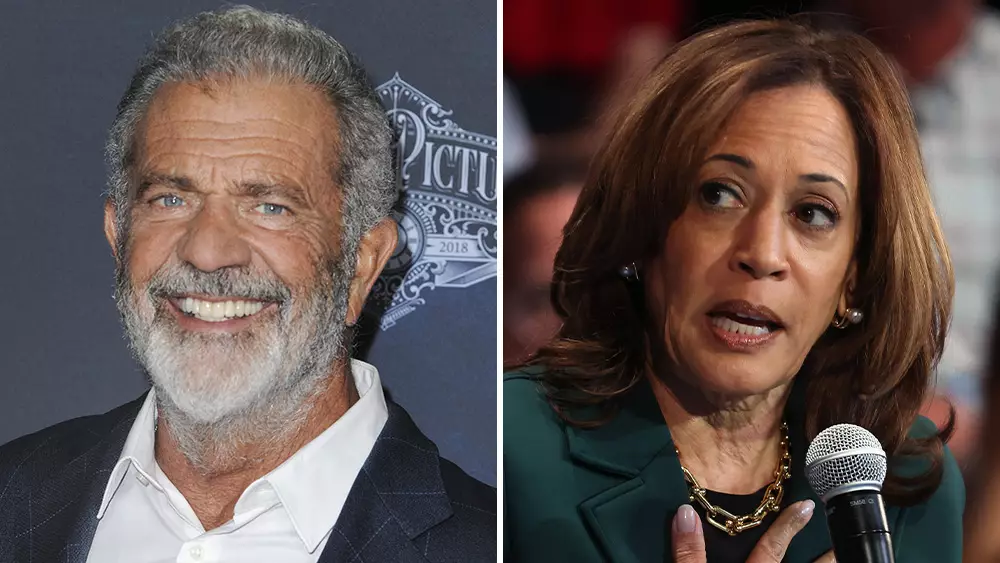In recent headlines, Andrew Garfield’s glowing endorsement of Mel Gibson, specifically acknowledging the director’s “beautiful healing with himself,” has sparked conversations on the reconciliation of artistry and personal demons. However, Gibson’s recent comments regarding Vice President Kamala Harris force a reevaluation of such acclaim. While Garfield expressed admiration for Gibson’s trajectory, the director’s blatant derogatory remarks about Harris—calling her the “IQ of a fence post”—raise critical questions about the thresholds of acceptable discourse, especially from influential figures.
Gibson’s choice of words isn’t new; it echoes a long history of inflammatory statements that have often placed him in the spotlight for all the wrong reasons. His previous offenses—from antisemitic rants during a DUI arrest to misogynistic outbursts—paint a troubling picture of an individual grappling with deeply ingrained biases. These incidents have rendered him a polarizing figure, raising questions about his transformation and whether one can indeed heal from such a troubled past.
Furthermore, the context surrounding Gibson’s remarks about Harris becomes even more troubling when juxtaposed with similar rhetoric from former President Donald Trump. Gibson’s alignment with Trump’s disparaging comments regarding Harris and her intelligence suggests a broader pattern of toxic political dialogue that seeks to undermine women in power. This interplay reveals a disturbing trend within parts of public discourse that trivializes intelligence and promotes misogyny under the guise of humor or political critique.
The intersection of Hollywood and politics often leads to an enthralling yet problematic narrative tapestry. Celebrities like Gibson wield substantial influence over public opinion, and when they engage in derogatory speech, it can normalize harmful ideologies. The case of Gibson illustrates how celebrities can simultaneously navigate their artistic feats while perpetuating harmful stereotypes or biases. When Garfield praises Gibson without acknowledging these complexities, it inadvertently endorses an environment where prejudices might flourish unchecked.
Moreover, Gibson’s vocal support for Trump—a figure consistently branded as “unhinged” and accused of fostering a divisive political climate—exemplifies a troubling alliance within celebrity culture. The blurring lines between personal admiration and political endorsement can lead to significant ramifications, especially when the ‘healed’ individuals resurface with rhetoric more reflective of past grievances than present growth.
It’s not only Gibson’s statements that warrant scrutiny; the reactions from the Hollywood community shine a light on its larger silence surrounding such rhetoric. While some individuals have faced backlash for their comments (including Gibson himself), the broader nuances of accountability within Hollywood often surface on the periphery. For every critique offered by celebrities, the collective community must consider if they truly advocate for integrity and respect, or if they choose to turn a blind eye for convenience.
The troubling behaviors exhibited by figures like Gibson should elicit a reflection among peers, suggesting a need for deeper engagement with the substance of commentary on sensitive issues. Hollywood’s selective outrage often leaves the door open for reformed individuals to step back into the limelight without the requisite accountability. This raises the question of who gets to define redemption narratives and how those tales are constructed and received in the public sphere.
As public figures continue to engage in dialogues that straddle the boundary between entertainment and politics, it becomes imperative that society holds these individuals accountable. The discourse evidenced through Gibson’s remarks calls for a reassessment regarding the narratives we accept and promote. Camel Harris’s steadfast presence as a Vice President demonstrates both progress and the persistent challenges women face in leadership roles.
Celebrities’ opinions can carry significant weight, shaping societal perceptions. Engaging critically with their rhetoric is essential for fostering progress towards a more inclusive and respectful dialogue. The path to healing, like that of Gibson, lies in an honest acknowledgment of past grievances, rather than a retreat behind acclaims devoid of critical reflection. As such, it is crucial to demand a conversation that transcends celebrity praise and actively dismantles harmful narratives, one comment at a time.

Leave a Reply